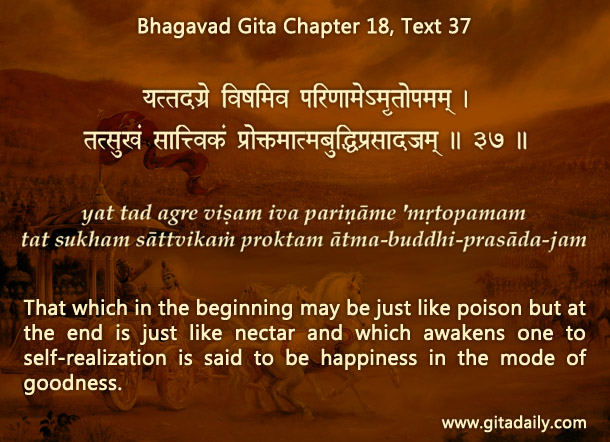Suppose a child doesn’t want to study a particular subject, say, math. He may protest to his mother, “I can’t do this.” If the mother naively believes him, he will never learn. That’s why a responsible mother will expertly push the child to study.
Our mind is like a child. It is averse to anything that requires hard work, and anything worthwhile almost always requires hard work. Pertinently, the Bhagavad-gita (18.37) states that meaningful joys seem like poison initially, but taste like nectar eventually. Unfortunately, we falter at the poison stage; we keep postponing difficult things such as studying a subject our mind doesn’t like. Eventually however, when we can’t postpone it any more, we get down to doing it, as when an exam is just a day away. Once we start, we soon experience that the work wasn’t as difficult as our mind had depicted.
Knowing this, if we persevere through the initial poison phase, we will duly come to the nectar. Once we glimpse that nectar, we discover that we can do what we had earlier believed was impossible. Not only that, we also gain greater belief that we can challenge our supposed limits in other life-areas too. Therefore, rather than accepting our mind’s diagnosis that we can’t do something, we can focus on analyzing whether we can take any small steps toward doing it and on taking those steps.
And the most important area where we need to challenge ourselves is in the area of our spiritual growth. We are at our core souls, who are parts of the divine; we are replete with spiritual virtues. If we commit to growing spiritually by striving to serve the supreme spiritual reality, Krishna, we can become wiser, tougher, happier.
Think it over:
- What is the nature of meaningful joys?
- What happens when we get down to doing difficult things?
- While pursuing something worthwhile, how can we persevere through the initial poison phase?
***
18.37 That which in the beginning may be just like poison but at the end is just like nectar and which awakens one to self-realization is said to be happiness in the mode of goodness.
To know more about this verse, please click on the image
Explanation of article:
Podcast:


Great message prabhuji. Hare krishna
Hare Krishna prabhu! Simply wonderful insights ! It said in marathi that unless we get into water we cant learn to swim. First we should go to water source. The mind cheats us to take that very first step for improvement. The courage and will to take that very first step is much important. Please share your views about how can we easily take that step